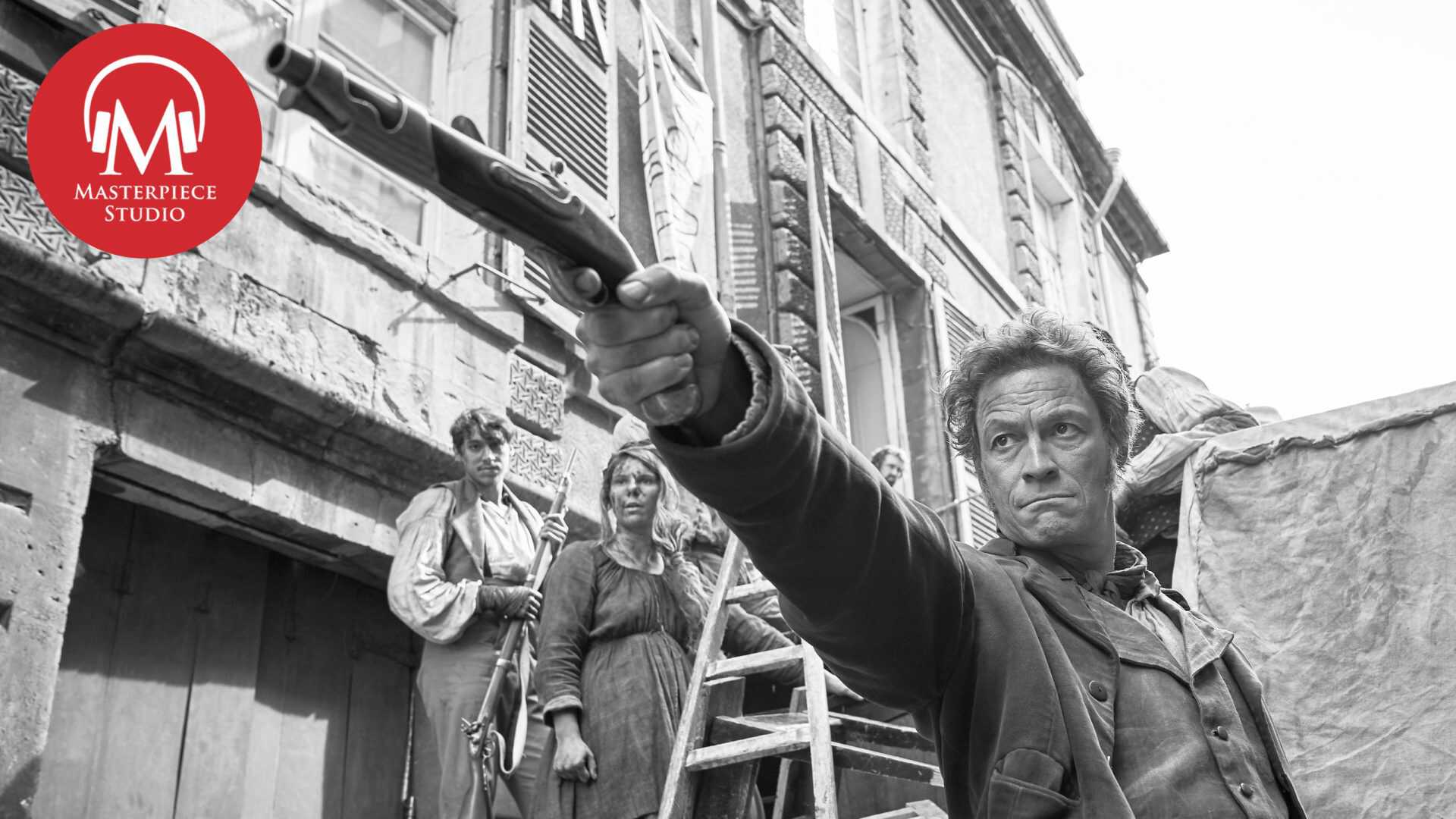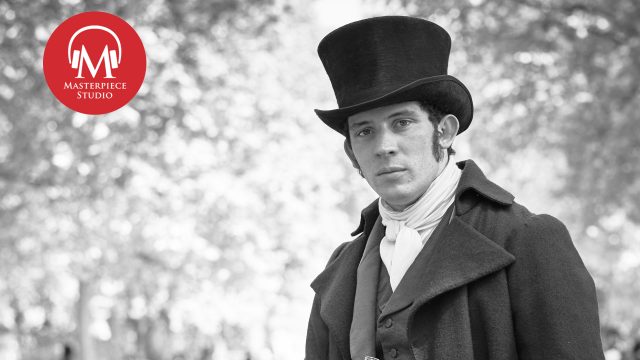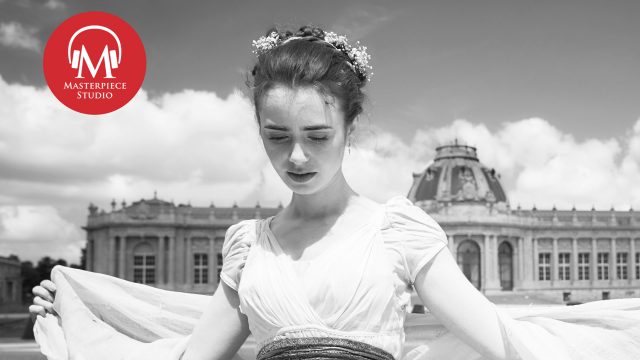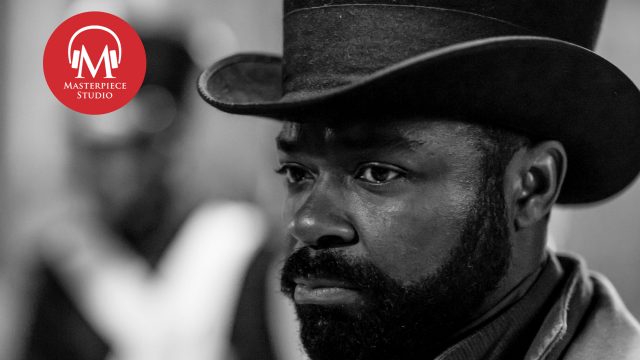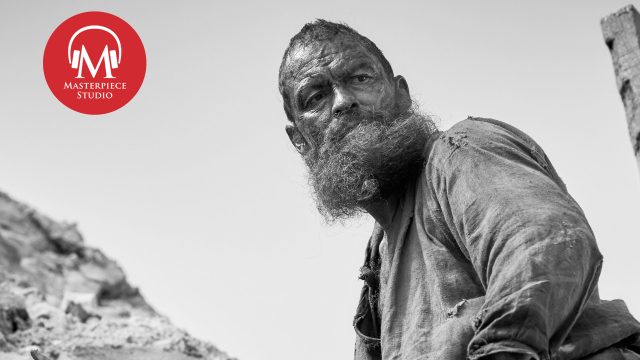After six dramatic episodes and several decades of on-screen struggle, Andrew Davies’ masterful new adaptation of Victor Hugo’s Les Misérables has ended. In a special episode of MASTERPIECE Studio, we hear from Davies and series stars Dominic West and David Oyelowo about how it felt to bring the story of Jean Valjean and Javert to a close.
Download and subscribe on: iTunes | Spotify| RadioPublic
Transcript
Jace Lacob: I’m Jace Lacob, and you’re listening to MASTERPIECE Studio.
After chaos in the streets of Paris, armed rebellion, and a trek through the sewers, Cosette and Marius Pontmercy have finally achieved wedded bliss.
CLIP
Cosette: Papa?
Valjean: Yes, my dear?
Cosette: Are you happy?
Valjean: Of course I’m happy. Happy for you!
Cosette: Then why aren’t you smiling?
Jace: And as the young couple enters their new life together, a wizened Jean Valjean slips away, surrounded by the love of his adopted daughter and her new husband. At long last, the tortured ex-convict has found peace.
CLIP
Valjean: I had things to tell you…never mind.
Cosette: Thank you.
Valjean: Love each other.
Jace: The dramatic ending of Victor Hugo’s classic tale comes to life in the final episode of MASTERPIECE’s new adaptation of Les Misérables, and we spoke to series lead actors Dominic West and David Oyelowo about the challenges they faced in bringing the story to a close.
Dominic: It was a bloody nightmare.
David: It was a very tough scene to do. It’s one of those scenes you read in a script and you go, ‘Oh boy, OK. When are we doing that?’
Jace: We also spoke to series writer Andrew Davies about his Herculean efforts to wrap up the remarkably lengthy novel in a neat six episodes.
Andrew: I do love the final moments of the story.
Jace: That’s all this week in a special episode of MASTERPIECE Studio.
For both Dominic West and David Oyelowo, this final episode of Les Misérables sees their characters, Jean Valjean and Inspector Javert, die. For Valjean, it’s a death among family, finally redeemed after a life on the run. For Javert, it’s a death by his own hand, drawing a somber close to his lifelong hunt. The physical and emotional challenges of both scenes weighed heavily on both actors.
Dominic: So much of Valjean, in his journey is an unconscious need to return to the prison hulks. I mean, he surrenders himself to Javert three or four times. I could never quite understand that in the book, but once I realized that incarceration and persecution devalues your sense of self-worth to the point where you believe that you don’t deserve anything else, that you belong in an institution, that you cannot survive outside of that institution and the brutality of that institution, and that’s the story of Valjean throughout, until the end when he realizes that his home is not in the prison hulks, it’s in the Bishop of Dean’s house, where he is reborn into the world of love and humanity. I think it’s an incredibly beautiful and symmetrical coming home, really, and indicative of his understanding where his home truly is.
David: It’s the culmination. It’s an iconic scene as well. But also I was being afforded the opportunity to bring more layering than maybe you’ve seen with that scene before. I didn’t jump into the river, because we needed to do more than one take. I had a stunt double who did that. But everything else, obviously, was me. There are certain scenes that are hard to talk about in an interview setting because they kind of go to the heart of what you try to do as an actor, which is to just tell the truth, and you hope that that’s what the audience receives, and that’s what I tried to do.
CLIP
Javert: Everything I have ever believed to be true…everything I lived my life by. And he…he…No matter. I shall of course be resigning my commission.
Rivette: Really, sir. One mistake, if it is indeed a mistake. One mistake, against a long career of…
Javert: How could I continue after this? I have brought myself and the police service into disgrace and disrepute.
Jace: For Davies, it was vitally important that Jean Valjean’s death be seen as uplifting.
Andrew: Well I think this is just at the heart of the whole thing. That the message of the story is that love will give us hope. And there can be optimism, and Cosette and Marius, particularly in the book, they’re not very wonderful characters but they do, I mean Marius does come to understand and love Jean Valjean, and Cosette recovers her love for him. And his death becomes meaningful and a happy death. It was something where as simple occupation that he could find peace. Nice for him to end his life there. And in a bit of a leap, you’ve got to have suspension of disbelief with the audience, because it’s not long since we’ve seen him, you know, old but strong. Now suddenly, he’s like all the all the strength is gone out of that huge body and he’s, yeah, he’s a dying man. And happy to be at the end of his life.
Jace: But even with the uplifting nature of Valjean’s death — the journey to that finale was anything but beautiful.
Dominic: I remember being very interested in knowing who they were casting as Marius, rather like King Lears are often very instrumental in the casting of Cordelia, because they have to carry her on at the end. So and then they revealed it was Josh. And he’s great you know he’s about six-foot-two. He’s not a small guy at all. So it was quite hard work carrying him around, but to sort of leven the seriousness of it, we had rats swimming around, real rats with rat wranglers swimming around us, but we had this very funny Belgian props man who had created the perfect turd, which is made out of roof insulation, which he then painted brown, and if you drop that in water, it looks just like a turd. It was a brilliant improvisation from the props department. And he kept plopping these things around us as we were trying to do this intense scene, and it did sort of provide a lot of hilarity. I remember crying with laughter, actually, as he kept propping these fake turds everywhere. So there was there was levity in the scene even if it doesn’t seem so.
Jace: A brief word from our sponsors…
Jace: Valjean and Javert’s six-episode cat-and-mouse chase comes to a head in the most unlikeliest of places: in a carriage. It’s one of the most tense and moving scenes in the miniseries, one in which Javert decides to ultimately let his quarry go.
CLIP
Javert: That young man…is he a particular friend of yours? Would you say he’s dear to you?
Valjean: Quite the contrary. If he lives, he intends to rob me of all my happiness.
Javert: And yet you…are you insane?
Valjean: No, I don’t think so. Are you?
David: We had the benefit of having played a lot of scenes with each other. And so I feel like a lot of the history the characters had, we also had as actors by then, in terms of playing that scene, and I think it really helped, because it’s a fairly simple scene, dialogue-wise, but it’s steeped in a lot of history and in a lot of, certainly for Javert, very real confusion as to how this man who for so long I’ve been able to demonize can truly be someone capable of that which I can never even quantify, that that’s a lot to pack into a carriage scene. He lets him go because he has had the revelation that redemption is possible. It is true that love is real. He has spent decades of his life denying those facts. So he let him go because he is seeing things differently. But in his past iteration, to do so would be madness, which it is, but to let him go was also the right thing to do, which is why he cannot live with himself. Because, who am I? In letting him go, my identity is lost. I have no idea who I am. I have no idea what to do beyond now. I have wasted my life pursuing that which is not true. And so I think when he says it’s an act of madness, he’s actually admitting to the fact that he is now descending into a kind of madness as a result.
Jace: As for Davies, he feels that why Javert chooses to let Valjean go should remain a mystery.
Andrew: I think this is again one of these mysterious parts of the book. That is almost best left as a mystery — ’I don’t know. ‘ I guess is the answer. And I think it’s more powerful if it’s left as something for the audience. Does Javert finally have some kind of understanding or acknowledgement? That might be it. That Valjean is a better man than he is, and deserves to go on and lead his life, with the implication that renders Javert’s whole existence and everything he’s been trying to do meaningless and that precipitates his suicide because he thinks, ‘Well, what have I been about? It’s all been it’s all been wrong and I have failed and I deserve death.’
Jace: I mean he is , Javert is so meticulous to the end, even in that suicide scene, he very carefully places his hat before he jumps. Thenardier watches him and waits for him to resurface, but he doesn’t. The script reads simply, ‘Nothing to be seen of Javert.’ Is that a metaphysical description as much as a practical one?
Andrew: Yeah, he’s annihilated himself. And of course before he goes, he leaves these little almost pettifogging little recommendations for things that have been annoying him about, oh, you know, treatment of prisoners and so on.
Jace: In a sharp bit of narrative craft, Andrew Davies wraps up his version of this multi-part epic with a pair of needy orphans. It was something that Davies saw as a sort of clarion call to action for his audience.
Andrew: I think that was keeping face with the idea of Les Misérables, the wretched. Jean Valjean has a happy death. Meanwhile, the inequality and the poverty and the struggles go on and there are those two little boys, who can’t look after themselves. They were briefly looked after by Gavroche, who did make a date with them to see them again. But Gavroche is dead. Who’s going to care for them now? So I wanted, yeah, that image to kind of burn its way into the conscience of the audience. You know? Go and give something to the food banks, go and vote to change the government, etcetera, etcetera.
Jace: You can watch all of Les Misérables now on PBS Passport, a member benefit from your PBS Member station. Find out more at PBS.org/GetPassport.
Coming up next on MASTERPIECE Studio, it’s our summer of Mystery, with new seasons of Endeavour and Grantchester — and new interviews with the stars of both series. In keeping with Mystery tradition, the bucolic Oxford and Grantchester remain the murder capitals of mid-20th century England.
CLIP
Endeavour: Hard to see how he could’ve kept Ann Kirby holed up all this time if he’s been living in a squat.
Box: Whoa, whoa whoa. Wait a minute. He’s your collar, Sergeant. This goes the distance — could be your ticket back to the big school. Unless you want to stay counting cabbages out in the sticks?
Thursday: Sergeant Morse’s got a point, sir. A thief and drug addict is one thing – a child murderer’s something else.
Jago: If he’s not involved – how’s he come by her satchel?
Endeavour: I was just asking. What if he didn’t do it?
Jace: Endeavour starts Sunday, June 16 on MASTERPIECE, and series lead Shaun Evans joins us here on the podcast on June 23 to discuss his sizable mustache and how it felt to be both in front of and behind the camera in this sixth season of the series.
Shaun Evans: You know where everyone needs to be in order to service the story so then it’s kind of thrilling to have the opportunity to decide where the camera goes and to tell the story from another point of view. But it just feels like an extension.
Jace: MASTERPIECE Studio is hosted by me, Jace Lacob and produced by Nick Andersen. Elisheba Ittoop is our editor. Susanne Simpson is our executive producer. The executive producer of MASTERPIECE is Rebecca Eaton.
CLIP
Jace: True or false: You were once arrested in Mexico for trying to break into Club Med.
Dominic: Yeah…I, well. True-ish. I had actually broken into Club Med and had three glorious days there when I was arrested. So, that part’s true. Yeah.
Les Misérables Podcasts 4 More Podcasts
MASTERPIECE Newsletter
Sign up to get the latest news on your favorite dramas and mysteries, as well as exclusive content, video, sweepstakes and more.








